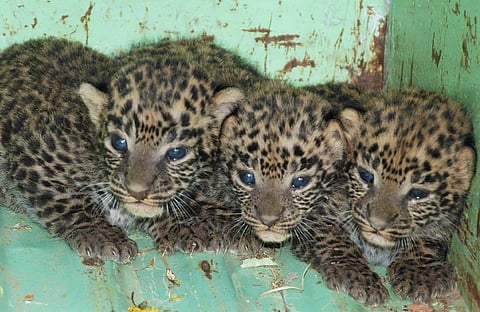

BENGALURU: Bannerghatta Biological Park (BBP) reported the death of seven leopard cubs since August 22, all aged below eight months old, due to Feline Panleukopenia infection in young.
A senior official from BBP told TNIE that this is the first time the cat family species in the zoo has been infected with this virus. Earlier the animals have suffered from various infections including foot and mouth disease, but now this one is new.
“Eleven leopards and one lion cub were infected with the virus. Interestingly, all the animals have been vaccinated for this virus, however, the animals that got this infection could be from a new strain. Now vaccination for this virus, will be included in the booster list to be administered to all animals,” said a BBP official.
According to the zoo management, it all started on August 21, when one vaccinated female leopard cub aged about eight months rescued from BRT tiger reserve suddenly fell ill and was treated immediately by administering fluids twice a day but still succumbed to death on August 22, 2023.
Immediate strict biosecurity measures and isolation measures were put in place. Postmortem examination and PCR diagnosis confirmed it as a feline panleukopenia virus (FPV) infection. “All the leopards in the zoo, rescue centre, and safari area were booster immunized against the disease (i.e, all the animals were previously immunized against this disease annually) vaccinated. So the wild cats could have got it from a human, who is in contact with domestic cats. Humans are the carriers of this virus” said the BBP official.
“Later four vaccinated leopards out of eight remaining leopard cubs in the safari area also started with clinical signs of the disease from August 22, and all were given fluid therapy and other necessary medications for a duration of 10 days. With these continuous efforts, two cubs survived out of four more affected vaccinated leopard cubs. The clinical signs of FPV infection were also observed in a vaccinated lion cub aged about eight months on September 2, 2023. Later the infection was seen in six other leopard cubs aged less than three months, on September 4, 2023. Four leopard cubs and one lion cub survived the infection 11 were affected leopard cubs and one lion cub. However seven leopard cubs in total died,” said the BBP officials.
FPV is a very highly contagious disease involving rapidly dividing cells, especially affecting enterocytes (intestines) and the immune system and is mostly seen in younger felids, with higher mortality in kittens and cubs. The virus can easily transmit from one animal to another animal through aerosol route, fomite and direct contact. The disease exhibits acute illness including fever, depression, anorexia, severe vomiting and, diarrhoea. Oral ulceration and icterus may be noted in complicated infections.
Death may result peracutely (within 24 hours) without much symptoms or from severe dehydration, secondary bacterial infections, and disseminated intravascular coagulation.
Cats between 3-5 months of age may be most susceptible to severe disease, which is exacerbated by concurrent gastrointestinal infections. The virus is so virulent and can affect even vaccinated animals. The virus is very sturdy and can remain in the environment for more than a year in the presence of organic matter and withstand the temperature of 60 degrees Celsius for one hour. If a pregnant animal or a newborn is affected it can lead to cerebellar hypoplasia and cerebellar ataxia in newborns if recovered, explained the BBP veterinarian.